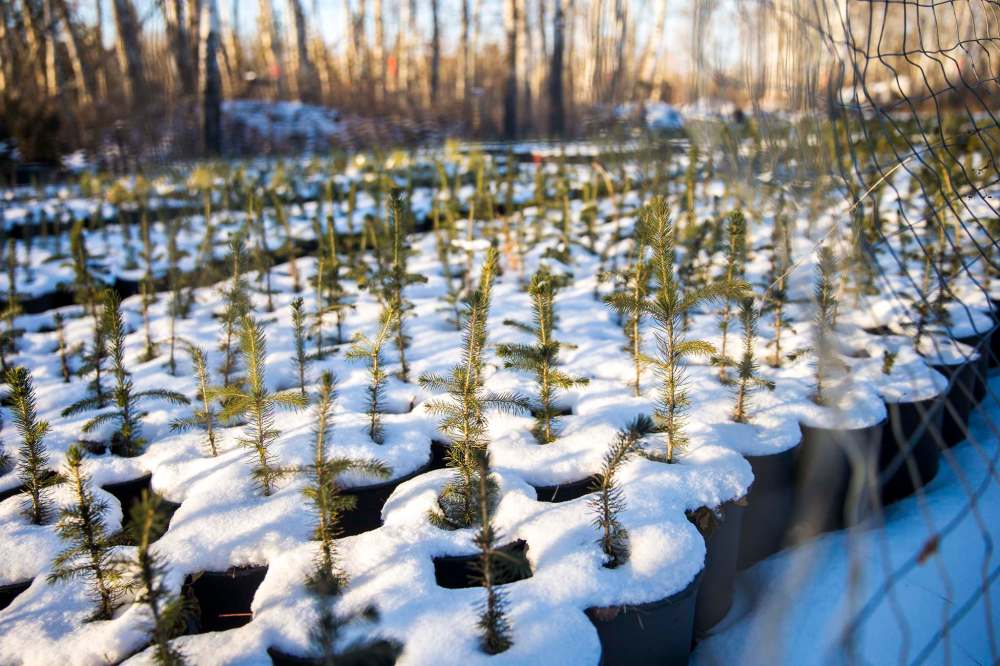Christmas tree farmers keep spirits bright as number wanes
Advertisement
Read this article for free:
or
Already have an account? Log in here »
To continue reading, please subscribe:
Monthly Digital Subscription
$19 $0 for the first 4 weeks*
- Enjoy unlimited reading on winnipegfreepress.com
- Read the E-Edition, our digital replica newspaper
- Access News Break, our award-winning app
- Play interactive puzzles
*No charge for 4 weeks then billed as $19 every four weeks (new subscribers and qualified returning subscribers only). Cancel anytime.
Read unlimited articles for free today:
or
Already have an account? Log in here »
Hey there, time traveller!
This article was published 11/12/2019 (1596 days ago), so information in it may no longer be current.
The number of Christmas tree farms in Manitoba has been chopped down to a quarter of the size it was two decades ago, due to changing consumer habits and a series of retirements in the industry.
At its peak in the early 2000s there were about 20 members of the Manitoba Christmas Tree Growers Association. Today, there are five.
“What happened was a lot of it became just too much for us to do. It wasn’t just a matter of planting trees and selling them in the fall; they had to be sheared and painted or tinted. It required a lot of year-round work,” said Ron Jackson, who ran Aspen Acres in Beausejour until he hung up his shears in 2008.
At the time of his retirement, Manitoba’s tree-growing business was still “going fairly strong," the 75 year old said, although many local producers were starting to age out of the physically-demanding work and there were few, if any at all, willing to fill the emerging gaps.
“We have tried to promote the industry. We’re tried to get new growers on board. We’ve been relatively unsuccessful,” said Dan Friesen, president of the Manitoba Christmas Tree Growers Association.

The group estimates roughly 2,500 Manitoba-grown trees will be sold this holiday season.
Mike Kisiloski runs one of a handful of remaining operations in the province in Tyndall, about 40 kilometres northeast of Winnipeg. The Country Pines Christmas Tree Farm has been a hobby of his since he began planting seedlings in 1992.
“I’m still healthy and still active, so I’m going to go until the kids take over,” the 71 year old said.
Still, Kisiloski understands why there are few people willing to put in the work to grow Christmas trees.
“It takes eight to 10 years to get a dollar off that tree, and who wants to wait eight to 10 years? Everybody wants the money right now,” he said.
An hour south, in Steinbach, Friesen runs Timber Trails Tree Farm, where he sells 500 Manitoba-grown trees every year. Another couple hundred, which are pre-cut on his lot, are out-of-province imports.
“The real Christmas tree industry is very alive and well; we can basically sell as many trees as we have available,” said Friesen, who has been in the business for 17 years. “Basically, what’s happening is, rather than the tree farms in Manitoba supplying the live Christmas tree end of it, there are just more trees being brought in.”

There are upwards of 1,800 farms that grow Christmas trees in Canada. The majority of them are concentrated in Quebec, Nova Scotia, Ontario, British Columbia and New Brunswick.
Combined, the farms brought in $114 million from tree sales last year. Of that total, Manitoba farmers brought in $528,000.
Friesen said consumers are becoming more aware of the different types of Christmas trees available, prompting increasing demand for fragrant varieties such as balsam, Fraser and Douglas fir. Those species struggle to grow in Manitoba due to the frigid climate.
“I don’t want to take away from Manitoba-grown trees, but a fir tree is a very nice tree,” Friesen said.
Spruce and Scotch pine (which Friesen describes as “long-needle and a little more pokey to the touch”) are the two species that fill farmers’ fields in the province.

wfpremovefromapp:
!function(e,i,n,s){var t=”InfogramEmbeds”,d=e.getElementsByTagName(“script”)[0];if(window[t]&&window[t].initialized)window[t].process&&window[t].process();else if(!e.getElementById(n)){var o=e.createElement(“script”);o.async=1,o.id=n,o.src=”https://e.infogram.com/js/dist/embed-loader-min.js”,d.parentNode.insertBefore(o,d)}}(document,0,”infogram-async”);
:wfpremovefromapp
Despite changes in the industry over the last 20 years, Kisiloski at Country Pines said one thing remains constant: families look forward to the annual tradition of chopping down a tree.
What keeps him going is the packed parking lot during the holiday season and customer smiles.
“Everybody’s in the Christmas mood when they get out of here," Kisiloski said.
maggie.macintosh@freepress.mb.ca
Twitter: @macintoshmaggie


Maggie Macintosh
Reporter
Maggie Macintosh reports on education for the Winnipeg Free Press. Funding for the Free Press education reporter comes from the Government of Canada through the Local Journalism Initiative.


